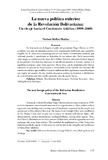| dc.rights.license | http://creativecommons.org/licenses/by-nc-sa/3.0/ve/ | |
| dc.contributor.author | Molina Medina, Norbert | |
| dc.date.accessioned | 2011-09-29T19:08:07Z | |
| dc.date.available | 2011-09-29T19:08:07Z | |
| dc.date.issued | 2009-06-30 | |
| dc.identifier.issn | 0798-9881 | |
| dc.identifier.uri | http://www.saber.ula.ve/handle/123456789/33804 | |
| dc.description.abstract | En Venezuela con la llegada al poder del presidente Hugo Chávez en 1999,
se inician una serie de transformaciones en la organización del Estado cuya expresión
tangible fue la redacción y promulgación de una nueva Constitución aprobada por
voluntad popular y sancionada en diciembre de ese mismo año. En la mencionada
carta magna se establecieron las bases de la Política Exterior, orientadas hacia el respeto
de los pueblos y los derechos humanos, la autodeterminación, el desarme nuclear y el
equilibrio ecológico, entre otros aspectos. Ahora bien, con la administración Chávez
comienza un proceso de acercamiento e intercambio en los vínculos con naciones del
continente asiático, que modifi có el patrón tradicional de la diplomacia venezolana hacia
esta región del mundo. En este sentido, buscamos analizar las fortalezas y debilidades
de unas relaciones que han venido tomando cada día mayor fuerza. | es_VE |
| dc.language.iso | es | es_VE |
| dc.publisher | SABER-ULA | es_VE |
| dc.rights | info:eu-repo/semantics/openAccess | |
| dc.subject | Revolución Bolivariana | es_VE |
| dc.subject | Política exterior | es_VE |
| dc.subject | Asia | es_VE |
| dc.subject | Multipolaridad | es_VE |
| dc.subject | Ideología | es_VE |
| dc.title | La nueva política exterior de la revolución bolivariana: Un viraje hacia el continente asiático (1999-2008) | es_VE |
| dc.title.alternative | The new foreign policy of the Bolivarian Revolution: A turn towards Asia (1999-2008) | es_VE |
| dc.type | info:eu-repo/semantics/article | |
| dc.description.abstract1 | Venezuela, with the President Hugo Chávez’s advent to government in 1999,
starts to experience several transformations in its organization as a State, whose evident
expression was drafting and enacting a new Constitution approved by the people and
sanctioned in December of that year. The basis of our Foreign Policy were established
in the Magna Carta, and its goal was a respect to nations and human rights, selfdetermination,
nuclear disarmament, ecological balance, among other aspects. Thus,
the Chávez’s administration started a process of diplomatic relations rapprochement and
exchange with some Asian nations. This modifi ed the traditional way of the Venezuelan
diplomacy with the region. In this sense, we seek to analyze the strengths and weaknesses
of these closer relations. | es_VE |
| dc.description.colacion | 115-137 | es_VE |
| dc.description.email | norbert@ula.ve | es_VE |
| dc.description.frecuencia | semestral | |
| dc.publisher.pais | Venezuela | es_VE |
| dc.subject.facultad | Facultad de Ciencias Jurídicas y Políticas | es_VE |
| dc.subject.keywords | Bolivarian Revolution | es_VE |
| dc.subject.keywords | Foreign political | es_VE |
| dc.subject.keywords | Asia | es_VE |
| dc.subject.keywords | Multi-polarity and Ideology | es_VE |
| dc.subject.publicacionelectronica | Revista Venezolana de Ciencia Política | |
| dc.subject.seccion | Revista Venezolana de Ciencia Política: Artículos | es_VE |
| dc.subject.thematiccategory | Ciencias Jurídicas y Políticas | es_VE |
| dc.subject.tipo | Revistas | es_VE |
| dc.type.media | Texto | es_VE |


